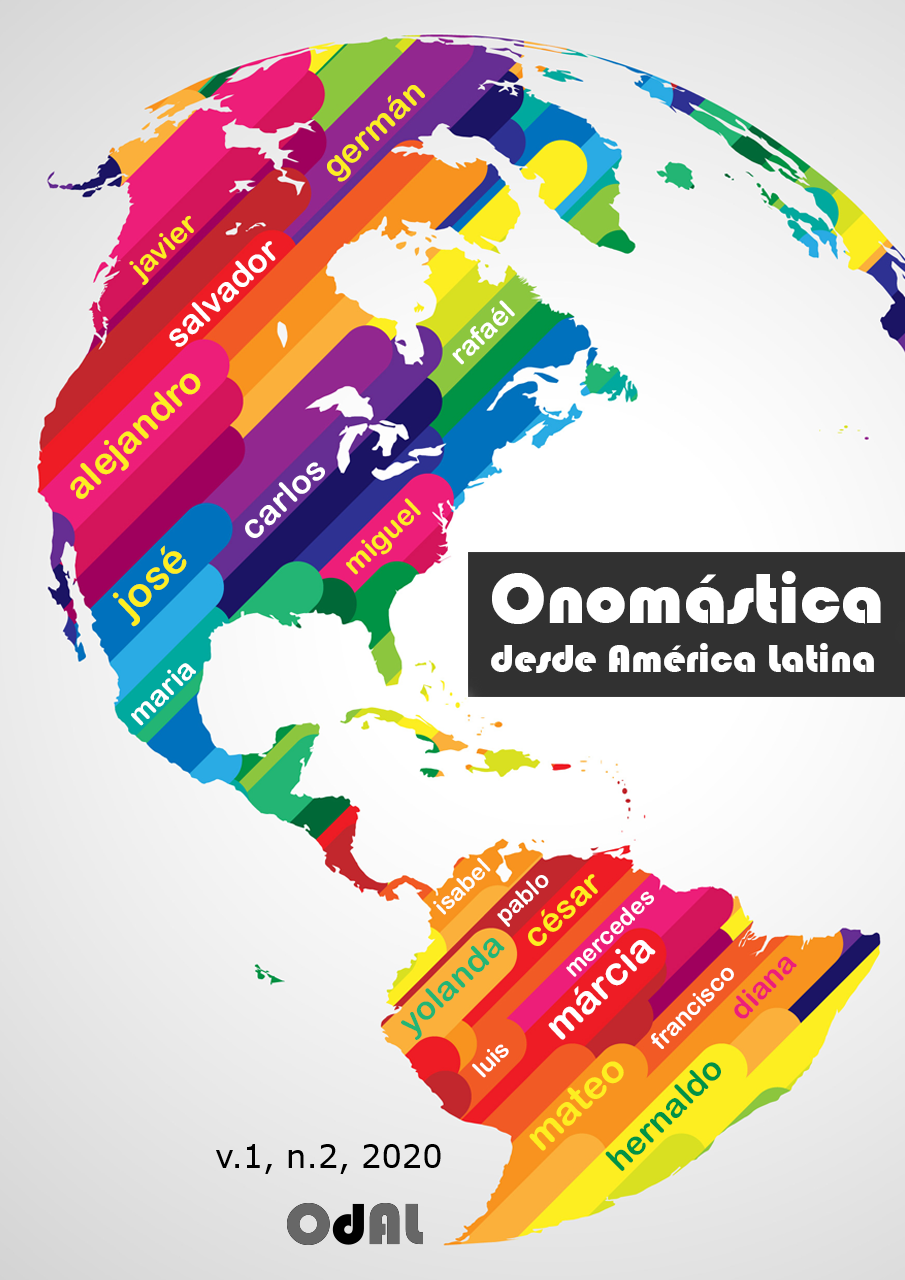Nomes e sobrenomes dos guarani e kaiowá de Mato Grosso do Sul
DOI :
https://doi.org/10.48075/odal.v1i2.25490Mots-clés :
Guarani, Kaiowá, AntroponomásticaRésumé
Nomes e sobrenomes guarani e kaiowá possuem uma origem histórica a partir do contato com os colonizadores europeus. Aos poucos, os nomes tradicionais estão entrando em desuso, do ponto de vista social, mas têm insistido a sua permanência do ponto de vista religioso, como uma espécie de proteção. Neste artigo, apresentamos um levantamento dos nomes civis de professores indígenas guarani e kaiowá que passaram pela Licenciatura Intercultural Indígena – Teko Arandu, Universidade Federal da Grande Dourados – UFGD, Mato Grosso do Sul. O levantamento foi realizado a partir do Sistema de Controle de Turmas do Professor. Em seguida, à luz de fatos históricos e sociais, apresentamos as funções sociais dos nomes na atualidade e postulamos as possíveis origens dos sobrenomes, considerando o processo de colonização pelo qual passaram esses povos. Os resultados do estudo não abrangem a origem dos sobrenomes na sua individualidade, mas apresentam um panorama das condições históricas e sociais que puderam dar condições à existência dessa nova forma de nomear e de indicar pertencimento familiar entre os indígenas guarani e kaiowá do cone sul de Mato Grosso do Sul.
Références
Barata, Carlos Eduardo de Almeida. Cunha Bueno, Antônio Henrique. (2001) Dicionário das famílias brasileiras. São Paulo: Ibero-América.
Borvão, Delfino (Ava Apykava Verandyjuruá); Teixeira, Atanásio (Nhomoendyja); Conscianza, Roseli; Aquino, Valdomiro; Silva, Alda, Juca, Getulio. (2019). Diagrama Cosmológico. Dourados.
Brand, Antonio. (1997). O Impacto da Perda da Terra sobre a Tradição kaiowá/Guarani. Porto Alegre, PUC. Tese de doutorado, Programa de Pós-Graduação em História, PUC, Porto Alegre, Rio Grande do Sul.
Cadógan, León. (1959). Ayvu Rapyta. São Paulo: USP.
Cavalcante, Thiago Leandro Vieira. (2013). Colonialismo, território e territorialidade: a luta pela terra dos Guarani e Kaiowá em Mato Grosso do Sul. Tese de Doutorado, Programa de Pós-Graduação em História, Universidade Estadual de São Paulo.
Chamorro, Graciela. (1994). Kurusu Ñe’ẽngatu ou palavras que a história não poderia esquecer. Dissertação de Mestrado, Programa de Pós-Graduação em História, Universidade do Vale do Rio dos Sinos, Campus São Leopoldo, Rio Grande do Sul.
______. (2008). Terra Madura, Yvyraguyje: Fundamento da Palavra Guarani. Dourados, MS: Editora UFGD.
______. (2015). História Kaiowa. Das origens aos desafios contemporâneos. São Bernardo do Campo: Nhanduti Editora.
Concianza, Fábio. (2017). Antroponímia kaiowá: Téry Tee Tekoha Panambizinho-Py. Trabalho de Conclusão de Curso da Licenciatura Intercultural Indígena – Teko Arandu, área de Linguagens, Universidade Federal da Grande Dourados.
Franco Júnior, Hilário. (1987). As Cruzadas. São Paulo: Brasiliense.
Guzmán, Ruy Díaz. (1980). Anales del Descubrimiento, Población y Conquista del Río de la Plata. Ediciones Comuneros. Asunción.
Leite, Serafim. (1956). Cartas dos Primeiros Jesuítas do Brasil. Tipografia Atlântica: Coimbra.
Martins, Andérbio Márcio Silva, et al. (2018). Antroponímia Kaiowá. In: Maria Suelí de Aguiar; Maria Célia Dias de Castro; Ana Lourdes Cardoso Dias. (Org.). Onomástica e a identidade do homem. Goiânia: Editora Impressa Universitária, 339-400.
Martins, Andérbio Márcio Silva, et al. (2017). Antroponímia Kaiowá. In: Maria Suelí de Aguiar; Maria Célia Dias de Castro; Ana Lourdes Cardoso Dias. (Orgs.). Onomástica e identidade do homem em seu meio. Santarém-Portugal: Instituto Politécnico de Santarém / Escola Superior de Educação, 267-308.
Novinsky, Anita. (2007). A Inquisição. São Paulo: Brasiliense.
Pereira, Levi Marques. Os Kaiowá em Mato Grosso do Sul: módulos organizacionais e humanização do espaço habitado. Dourados-MS: Ed. UFGD, 2016.
Rodrigues, Aryon Dall’Igna. (1984-85). Relações internas na família lingüística Tupí-Guaraní. Revista de Antropologia, 27/28, p. 33-53. São Paulo.
Sousa, Neimar Machado. (2009). A Catequese Colonial Jesuítica entre os Índios Itatines. Tese de Doutorado, Programa de Pós-Graduação em História, Universidade Federal de São Carlos.
Susnik, Branislava. (1979-1980) Los aborígenes del Paraguay II, Etnohistoria de los Guaranies. Época colonial. Asunción: Museo Etnográfico Andrés Barbero.
Téléchargements
Publié-e
Comment citer
Numéro
Rubrique
Licence
(c) Tous droits réservés Revista Onomástica desde América Latina 2020

Cette œuvre est sous licence Creative Commons Attribution - Pas d'Utilisation Commerciale - Partage dans les Mêmes Conditions 4.0 International.
Droit d’auteur « Creative Commons »
Politique pour les revues en accès ouvert
Les auteurs qui publient dans cette revue agréent les termes suivants :
1. Les auteurs gardent leurs droits et octroient à la revue celui de première publication. Le texte sera sous licence « Creative Commons Attribution » qui permet le partage du travail mentionnant l’attribution à l’auteur et la première publication dans cette revue.
2. Les auteurs ont l’autorisation de prendre ailleurs des contrats supplémentaires pour la distribution et diffusion non exclusive de leur texte publié dans cette revue (par exemple, le publier dans un dépôt numérique institutionnel ou en tant que chapitre d’un livre).
3. Les auteurs ont l’autorisation et sont encouragés à publier et à distribuer leur travail en ligne (par exemple, dans des dépôts numériques institutionnels ou dans leur propre site personnel) à n’importe quel moment y compris avant ou pendant le processus d’édition, étant donné que cela peut avoir des effets productifs, tels qu’augmenter l’impact et le nombre de citations du travail publié (cf. O Efeito do Acesso Livre).
Licence « Creative Commons »
Cette publication se trouve sous licence Creative Commons- Attribution- Utilisation non commerciale, -Pas d’œuvre dérivée 4.0 International, ce qui permet de partager, copier, distribuer, montrer ou reproduire la totalité ou des parties des travaux, tant que ce n’est pas fait à des fins commerciales et que les auteurs et la source sont cités.

